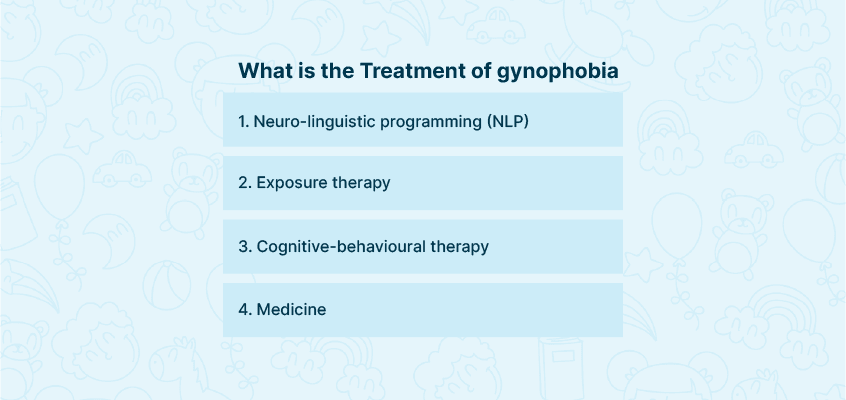Gynophobia Definition
Anxiety can lead to irrational fears, such as gynophobia [1] – the fear of approaching a woman. Males affected by gynophobia fear facing women and tend to avoid them. Such behaviour could be due to a previous negative experience with women. With little effort and assistance, you can help yourself get rid of this phobia.
What is Gynophobia?
Gynophobia is the fear of women. Specific social anxiety impacts people’s relationships with female relatives and friends. Although it is not as common as other phobias, it still exists and affects people in the same way as any other fear does.
What are the Causes of Gynophobia
- Likely, some males develop this fear during childhood [2]. Physical or mental abuse, assault, neglect, rape, or sexual harassment are examples of childhood trauma that a female figure could have caused.
- Genetics, environmental factors, and a family history of phobias and anxiety disorders can also cause [3].
- In teenage boys, it can be a form of social anxiety. It’s a fear of being disliked, rejected, or unwanted around women.
- Fear can develop due to repeated negative experiences with women. It can also happen if you constantly hear others having a bad experience with women.
- An insecure man who does not feel good about himself will believe he is unworthy of pleasing a woman. They tend to be more sensitive, pessimistic, and have a low sense of self-worth.
The Symptoms of Gynophobia
- Anxiety intensifies when a woman gets physically closer.
- The overwhelming fear of women.
- Social withdrawal whenever women are involved.
- Avoid women consciously.
- Difficulty in carrying out daily tasks due to this fear.
- Physical symptoms include rapid heartbeat, sweating, chest tightness, upset stomach and difficulty breathing.
- Dizziness when you think of or see a woman.
- Upset stomach
- Crying or refusing to leave a male parent’s side may show children’s gynophobia.
Gynophobia Test
You may be experiencing gynophobia symptoms if the fear of women interferes with your ability to live a whole life either at the workplace, in public places, or relationships. A physician or a specialist can confirm this through a screening test. They’ll ask about your symptoms and your medical, psychiatric, and social background. Your doctor will also perform a physical examination to rule out any somatic issues causing your anxiety. They will refer you to a specialist for treatment if they suspect you have gynophobia or other anxiety disorder.
How to get rid of Gynophobia
- Make a backup plan to face the worst scenario. Make a list of everything that could go wrong, and plan for what to do if it does. If you have a plan, you will never be afraid because you will know how to handle any situation.
- Talk positively and encourage yourself. Say to yourself, “This is my greatest fear, and I can overcome it.”
- Take small steps until you feel at ease. Work on improving certain aspects of your life to grow your self-confidence to the point where you can start talking to women comfortably.
- Lack of self-esteem is the most common cause of nervousness. Recognize your worth. See yourself as a valuable individual who deserves to be loved and respected. It will boost your self-esteem.
- Imagine talking to women safely without hesitation instead of imagining fear and rejection. Visualization helps you feel more confident about yourself when facing women in real life.
- Do not be afraid of rejection. Do not be worried about what will happen and if this person will reject you. Just be yourself and talk to her without paying heed to the outcome.
- Do not judge yourself and think that nobody will listen to you and make a fool of yourself. Every time you believe in such a way, modify your thoughts and replace them with more positive ones that help you feel calmer.
- Alcohol or drugs will not help you overcome your fear or anxiety. Instead, try making better lifestyle choices like sleeping early and going for a walk, which can help to calm your senses.
- Lifestyle management includes meditation to reduce anxiety. Relaxation techniques like yoga and deep breathing help cope with anxiety and stress.
- If gynophobia interferes with your ability to function in everyday life, it’s time to seek treatment.
The Treatment of Gynophobia [4]
Psychotherapy is the most effective treatment for gynophobia which includes,
- Neuro-linguistic programming (N.L.P.) is a method to change your thoughts and behaviour.
- Exposure therapy: The therapist will slowly introduce you to things related to women in exposure therapy. The idea is to gradually expose your mind until you are ready to meet a real-life woman.
- Cognitive-behavioural therapy: This is combined with exposure therapy to change the perspective on how you view the phobia, how to cope with the bodily sensations, and how to deal with the emotional impact it has on your life.
- Medicine: This is important in addition to treatment. It helps you during panic attacks outside therapy. Medications also help speed up the recovery but must be used only under medical supervision.
Conclusion
Proper steps should take to overcome this phobia. It is also essential to treat children who are suffering from gynophobia. If assistance is required, seek it. If needed, you can seek professional help from United We Care, an online mental health well-being and therapy platform that offers professional advice on combating emotional and mental challenges.
References:
[1] M.-P. Moreau, “The masculinisation of the teaching profession or gynophobia as education policy,” Educational Research for Social Justice, pp. 189–203, 2021, DOI: 10.1007/978-3-030-62572-6_9. [Online]. Available: https://link.springer.com/chapter/10.1007/978-3-030-62572-6_9. [Accessed: 1 August 2022]
[2] D. A. Axelson and B. Birmaher, “Relation between anxiety and depressive disorders in childhood and adolescence,” Depression and Anxiety, vol. 14, no. 2, pp. 67–78, 2001, DOI: 10.1002/da.1048. [Online]. Available: https://onlinelibrary.wiley.com/doi/abs/10.1002/da.1048. [Accessed: 1 August 2022]
[3] B. R. H. Van den Bergh, E. J. H. Mulder, M. Mennes, and V. Glover, “Antenatal maternal anxiety and stress and the neurobehavioural development of the fetus and child: links and possible mechanisms. A review,” Neuroscience & Biobehavioral Reviews, vol. 29, no. 2, pp. 237–258, Apr. 2005, DOI: 10.1016/j.neubiorev.2004.10.007. [Online]. Available: https://www.sciencedirect.com/science/article/abs/pii/S0149763404001307. [Accessed: 1 August 2022]
[4] E. Cirino, “Gynophobia: What You Should Know,” Healthline, 7 November 2017. [Online]. Available: https://www.healthline.com/health/mental-health/gynophobia#:~:text=What%20is%20gynophobia%3F,of%20women%20is%20called%20gynophobia.. [Accessed: Aug. 01, 2022]











